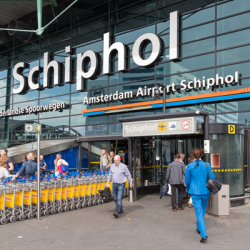Amsterdam Schiphol upgrades fire training aircraft, the FireFly
Looking to the future, Schiphol has upgraded the FireFly, encorporating elements based on the Airbus A380 to enable more intensive fire fighting training exercises.
List view / Grid view


Schiphol Airport is the main airport in the Netherlands and is approximately twenty minutes from Amsterdam city centre by train.
It is the third busiest airport in Europe in terms of passenger traffic. The airport has six runways and one passenger terminal which is divided into three departure areas.
Built on what was once a large lake, Schiphol Airport is one of the world’s lowest airports, lying three metres below sea level.
Looking to the future, Schiphol has upgraded the FireFly, encorporating elements based on the Airbus A380 to enable more intensive fire fighting training exercises.
Schiphol has taken significant steps towards making the aviation industry more environmentally friendly, but have acknowledged that the pace of progress towards sustainability needs to be increased.
Dutch airline KLM, is changing the way in which we travel intercontinentally, reducing the number of flights with replacement train travel.
Amsterdam Airport Schiphol and the Ministry of Infrastructure and Water Management plan to invest in safe, swift and sustainable modes of commuting.
In a bid to maximise the longevity of Schiphol Airport, construction work is taking place throughout the terminal to ensure the airport is ready for the exponential growth of passengers through its doors.
The highest point has been reached in the construction of a new Pier A at Amsterdam Airport Schiphol.
Vision-Box and partners have signed an agreement to officially launch the “Known Traveller Digital Identity” service, which will facilitate paperless border clearance between Canada and The Netherlands.
As part of Schiphol's Future Sustainability, Denise Pronk - Head of Sustainability at Schiphol, explains how investing in sustainable aviation fuel is vital to the success of lowering the environmental impact of aviation.
Non-aeronautical revenues are essential to airports' financial health, so we asked industry experts how they ensure they reap the benefits of airport incomes.
Recent information screen blackouts at Gatwick and Heathrow have highlighted that airports need to diversify their information delivery systems.
In collaboration with Delft University of Technology, Schiphol will act as a 'living lab' for the next five years as the partnership aims to develop innovation throughout the airport.
A new trade agreement between Amsterdam Airport Schiphol and Hartsfield-Jackson Atlanta International Airport will digitally and physically connect the airports; increasing cargo trade between the two.
Schiphol offers Chinese passengers a unique travel and shopping experience with WeChat services around the airport.
Our 'Sustainability Series' continues with a look to the future for aviation fuel; we spoke to Jose Gerardo Gonzalez Barron, from the SBRC, who told us how fuel from halophytic plants is the way forward.
Passenger Predictability solutions will be expanded to cover all processes at Birmingham Airport, to help make more informed strategic resourcing, facility and expansion planning decisions, following successful queue management strategies.